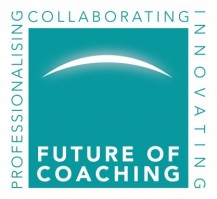PRESS RELEASE – 15 March 2017
FOR IMMEDIATE RELEASE
Buyers and suppliers of coaching now have a comprehensive guide to help them define, articulate, purchase and deliver high calibre professional executive coaching in organisations.
Future of Coaching Collaboration (FCC), a multi-stakeholder group comprising volunteers from corporates, professional bodies, academia, research bodies and Coaching at Work, has produced a guidance document setting out definitions, principles and practices for professional executive coaching in organisations.
The document is the result of a work over a number of years from volunteers from organisations including Association for Coaching; Association for Professional Executive Coaching and Supervision; AoCS (Association of Coaching Supervisors); British Association for Counselling & Psychotherapy Coaching; Civil Service Learning; Coaching at Work; European Mentoring & Coaching Council; GSK; International Centre for Coaching & Mentoring Studies at University of Greenwich; International Coach Federation; John Lewis; KPMG; News UK; Oxford Brookes University; PwC, and Ridler & co.
The document, Framework for Professional Executive Coaching in Organisational Settings, seeks to define the boundaries of professional coaching in organizational settings, and is intended to support both coaching sponsors in organisations, internal coaches and external coaches to identify boundaries and best practice, among others.
FCC is a multi-stakeholder group launched in April 2015 with the aim of collaborating to raise the bar and shape the future of the coaching profession. The group, facilitated by Coaching at Work, emerged from the Accreditation Forum (the brainchild of Mike Hurley, former representative of the former Coaching Bodies Round Table, and Liz Hall, editor of Coaching at Work), also facilitated by Coaching at Work, which gathered professional body representatives with coaching sponsors to increase collaboration.
The document, Framework for Professional Executive Coaching in Organisational Settings, is not intended to replace what is already in place within accrediting bodies in terms of ethical guidelines and codes of conduct, for example. It is also expected that the document will be updated. With this in mind, comments and responses are welcome.
Please address these to:
The document can be viewed here:
Further information/note to editors and others
Future of Coaching Collaboration (FCC) (www.futureofcoaching.org) is a multi-stakeholder group launched in April 2015 with the aim of collaborating to raise the bar and shape the future of the coaching profession. The group emerged from the Coaching at Work-led Accreditation Forum, which gathered professional body representatives with coaching sponsors to increase collaboration. Work done by members of the Forum led to a number of initiatives including a set of comparison tables, comparing professional bodies’ ethos, rationales and philosophies. These can be viewed here: http://www.coaching-atwork.com/category/accreditation-hub/
The FCC seeks to be wider in scope and communities represented. For example, it now includes representatives from academia and has expanded its focus to include developing guidance on best practice; continued alignment across accrediting bodies on standards and quality control, and ethics, including a common code of conduct.
Coaching at Work continues to facilitate the group and is to provide an online independent ‘home’ for the group.
FCC members include:
- Ashridge Business School
- Association for Coaching
- Association for Professional Executive Coaching and Supervision
- Association of Coaching Supervisors (AoCS)
- Association of Integrative Coach-Therapist Professionals
- British Association for Counselling & Psychotherapy Coaching
- British Psychological Society Special Group in Coaching Psychology
- Coaching at Work
- European Mentoring & Coaching Council (EMCC)
- EMCC UK
- GSK
- International Centre for Coaching & Mentoring Studies at University of Greenwich
- International Coach Federation
- International Society for Coaching Psychology
- John Lewis Partnership
- KPMG
- Oxford Brookes University
- PwC
- Ridler & co
- And individuals who formerly worked at News UK, and at Kent County Council.

